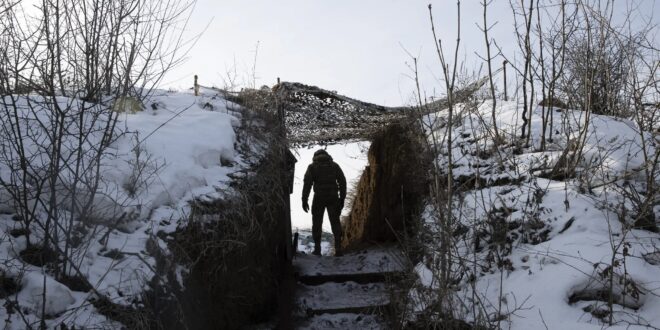One of the hardest challenges in geopolitics is figuring out how to conduct a successful retreat. We witnessed that reality last summer in Afghanistan, when the Biden administration made the correct strategic choice — cutting our losses instead of escalating to preserve a morally bankrupt status quo — but then staggered through a disastrous withdrawal that wounded Biden’s presidency and laid bare American incompetence to a watching world.
Now we face the same problem with Ukraine. The United States in its days as a hyperpower made a series of moves to extend our perimeter of influence deep into Russia’s near-abroad. Some of those moves appear to be sustainable: The expansion of NATO to include countries of the former Warsaw Pact was itself a risk, but at the moment those commitments seem secure. But the attempt to draw Ukraine out of Russia’s orbit, the partway-open door to Ukrainians who preferred westward-focused alliances, was a foolish overcommitment even when American power was at its height.
Note that this is not a question of what Ukrainians deserve. Russia is an authoritarian aggressor in the current crisis; Ukraine is a flawed democracy but a more decent regime than Vladimir Putin’s oligarchy. When we gave Ukraine security assurances under Bill Clinton, opened the door to NATO membership under George W. Bush and supported the Maidan protests under Barack Obama, we were in each case acting with better intentions than Moscow in its own machinations.
But in geopolitics good intentions are always downstream from the realities of power. Whatever its desires or ours, the government in Ukraine has simply never been in a position to fully join the West — it’s too economically weak, too internally divided and simply in the wrong place. And the actions of the Bush and Obama administrations — and for all of Trump’s personal sympathies for Putin, some Trump administration acts as well — have left us overstretched, our soft-power embrace of Kyiv ill-equipped to handle hard-power countermoves from Moscow.
Given those realities, and the pressing need to concentrate American power in East Asia to counter China, it’s clear enough where an ideal retreat would end up: with NATO expansion permanently tabled, with Ukraine subject to inevitable Russian pressure but neither invaded nor annexed, and with our NATO allies shouldering more of the burden of maintaining a security perimeter in Eastern Europe.
But as with Afghanistan, the actual execution is harder than the theory. Coming to a stable understanding with Putin is challenging, because he’s clearly invested in being a permanent disrupter, taking any opportunity to humiliate the West. Extricating ourselves from our Ukrainian entanglements will inevitably instill doubts about our more important commitments elsewhere, doubts that will be greater the more Kyiv suffers from our retreat. And handing off more security responsibility to the Europeans has been an unmet goal of every recent U.S. president, with the particular problem that a key European power, Germany, often acts like a de facto ally of the Russians.
Given those difficulties, the Biden administration’s wavering course has been understandable, even if the president’s recent news conference was too honest by several orders of magnitude. The United States cannot do nothing if Russia invades Ukraine; we also would be insane to join the war on Ukraine’s side. So the White House’s quest for the right in-between response, some balance of sanctions and arms shipments, looks groping and uncertain for good reason: There’s simply no perfect answer here, only a least-bad balancing of options.
But my sense is that we are still placing too much weight on the idea that only NATO gets to say who is in NATO, that simply ruling out Ukrainian membership is somehow an impossible concession. This conceit is an anachronism, an artifact of the post-Cold War moment when it briefly seemed possible that, as the historian Adam Tooze puts it, the world’s crucial boundaries “would be drawn by the Western powers, the United States and the E.U., on their own terms and to suit their own strengths and preferences.”
That’s not how the world works now, and precisely because it’s not how the world works I would be somewhat relieved — as an American citizen, not just an observer of international politics — to see our leaders acknowledge as much, rather than holding out the idea that someday we might be obliged by treaty to risk a nuclear war over the Donbas.
And if we cannot give up the idea outright, the idea of giving it up for some extensive period — like the 25 years suggested by Thomas Graham and Rajan Menon in a recent Politico op-ed — seems like a very reasonable deal to make.
Something can be reasonable and still be painful — painful as an acknowledgment of Western weakness, painful to the hopes and ambitions of Ukrainians.
But accepting some pain for the sake of a more sustainable position is simply what happens when you’ve made a generation’s worth of poor decisions, and you’re trying to find a decent and dignified way to a necessary retreat.
 Eurasia Press & News
Eurasia Press & News


